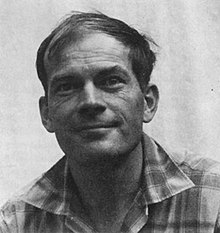Robert MacArthur
| Robert Helmer MacArthur | |
|---|---|
 |
|
| Born |
April 7, 1930 Toronto, Ontario |
| Died | November 1, 1972 (aged 42) renal cancer |
| Fields | Ecology |
| Thesis | (1958) |
| Doctoral advisor | G. Evelyn Hutchinson |
| Known for | Study of community and population ecology |
Robert Helmer MacArthur (April 7, 1930 – November 1, 1972) was a Canadian-born American ecologist who made a major impact on many areas of community and population ecology.
MacArthur was born in Toronto, Canada, and later moved to Marlboro, Vermont as his father, John Wood MacArthur, moved from the University of Toronto to Marlboro College. MacArthur received his Bachelor's degree in mathematics from Marlboro College, followed by a Master's degree in mathematics from Brown University in 1953. A student of G. Evelyn Hutchinson, MacArthur earned his Ph.D. from Yale University in 1958; his thesis was on the division of ecological niches among five warbler species in the conifer forests of Maine and Vermont.
MacArthur was a professor at the University of Pennsylvania, 1958–65, and professor of biology at Princeton University, 1965-72. He played an important role in the development of niche partitioning, and with E.O. Wilson he co-authored The Theory of Island Biogeography, a work which changed the field of biogeography, drove community ecology and led to the development of modern landscape ecology. His emphasis on hypothesis testing helped change ecology from a primarily descriptive field into an experimental field, and drove the development of theoretical ecology.
...
Wikipedia
